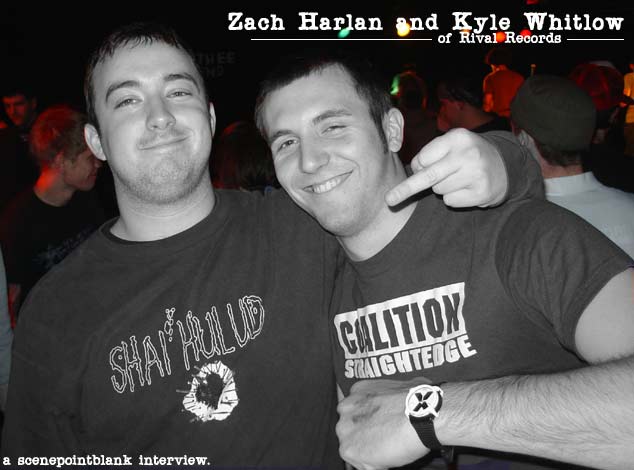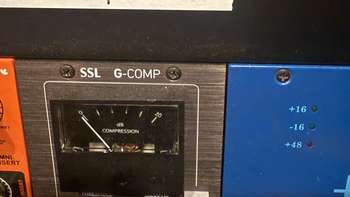 If you don't mind, let's go back in time. More specifically, to the early 80's when hardcore was fresh and submerging from the murky depths of the vaginal passage of birth. In the beginning, SST and Dischord were the majors of hardcore, but as time passed, so did their popularity in the hardcore kids eyes. Then labels like Revelation and Victory began putting out the records that the kids sought. As those labels have begun to move in other directions, we begin to wonder what's going to take over. Bridge 9 is definitely one of the hugest labels, but their momentum seems to be slowing down. While everybody is down floorpunching, Rival Records out of the bay area in California sneaks out ninja style and decapitates everybody. Here we have an interview with label co-owner Kyle Whitlow giving some secret codes/easter eggs to the industry that is record labels. Click on, comrades, or ninjas will rock your world (in a bad way). And oh yeah, that was a very broad/vague synopsis of hardcore labels, so don't scold me on my historical inaccuracy, this time machine is hella wack.
If you don't mind, let's go back in time. More specifically, to the early 80's when hardcore was fresh and submerging from the murky depths of the vaginal passage of birth. In the beginning, SST and Dischord were the majors of hardcore, but as time passed, so did their popularity in the hardcore kids eyes. Then labels like Revelation and Victory began putting out the records that the kids sought. As those labels have begun to move in other directions, we begin to wonder what's going to take over. Bridge 9 is definitely one of the hugest labels, but their momentum seems to be slowing down. While everybody is down floorpunching, Rival Records out of the bay area in California sneaks out ninja style and decapitates everybody. Here we have an interview with label co-owner Kyle Whitlow giving some secret codes/easter eggs to the industry that is record labels. Click on, comrades, or ninjas will rock your world (in a bad way). And oh yeah, that was a very broad/vague synopsis of hardcore labels, so don't scold me on my historical inaccuracy, this time machine is hella wack.
ScenePointBlank: How did you get into starting a label? Being in a band before, why not do a new band, why a label? How has your perspective changed about labels while being in a band to actually running one?
Kyle Whitlow: Zach and I grew up together in a small town called Oroville, CA and have been best friends since we were 5 years old. We basically got into hardcore punk together and had always talked about how we would like to do a label someday. Eventually, Zach transfered to Portland St. for college and I moved to the SF Bay Area after I graduated college. My band, The Damage Done, was coming to a close, and I needed something to keep me involved.
There was this band in Portland called the PHYSICAL CHALLENGE who was turning into a really awesome band, but not many people were taking notice. Zach proposed we start the label with a record for them, so we took off and ran with it. We contacted them in May of 2003, and a few months later, in July of 2003, RIVAL001 Physical Challenge - "Some Still Care" was in our hands.
We started this label for two reasons, really: 1. we were sick of seeing good bands going un-noticed because they didn't have "ex-members-of" status or weren't the "cool" kids in their scene or were from an area of the country where straight up hardcore just doesn't really exist... We wanted to change that and help out bands that DESERVED to be heard. and 2. Zach and I are both getting a little older and tied down, and we can't do some of the things we used to do, namely drive hundreds of miles to see shows and/or play shows every weekend. So we wanted to do something that would allow us to give back to something that has given us so much over that last 7 or 8 years. I think that kind of explained the other part of your question - why not do another band... I work a full-time "career" type job, I've got a serious girlfriend, a dog, etc, and I just can't do a band at the level that I'd want to. I don't do things half-assed. I saw the label as something I could pour my time into, but wouldn't require a ton of traveling.
Also, towards the end of The Damage Done, I really just decided that I didn't like singing in a band much anymore. I had developed a phobia of my own voice and it sometimes just made me sick to my stomach when I would even think about playing shows. It sounds retarded, but it's the 100% truth. I never had it before, but one day it just started and it was hard to shake. To this day, the thought of singing in a band just kind of makes me feel ill and I doubt I'll ever do it again. Part of it was that I just got burnt out really badly, too. Anyways, since I don't play any instruments, I don't see myself being in a band again. As far as my perspective changing about labels - I always knew it would be a ton of work, but now I truly realize what it means to REALLY run a record label. Putting out the actual record is the EASY part. Providing tour support for your bands,getting them solid shows, getting them good looking merch, advertising for their record, sending out HUNDREDS of promos to zines and college radio, continually trying to get better distribution, simply handling mail order - all of that stuff is what it REALLY means to run a label. And unfortunately, most kids just think "oh yeah, i'll throw down $1,500 and put out a record and start a label". And while that's awesome that kids are thinking that way, it just isn't enough if you want to really support your bands and allow them to tour and do the things that they want to do with their band.
I don't think kids take into account the amount of time and energy spent on buying ads, designing ads, sending out promos, constantly trying to find new places to advertise and/or send promos to, etc. Basically, I realize now that most people don't have much of a clue of what it means to run a label, and with a little hard work, any kid can do it, but unfortunately most bands get screwed because dudes who decide they're going to "start a label" just arent' very on top of things - they're not organized at all.





